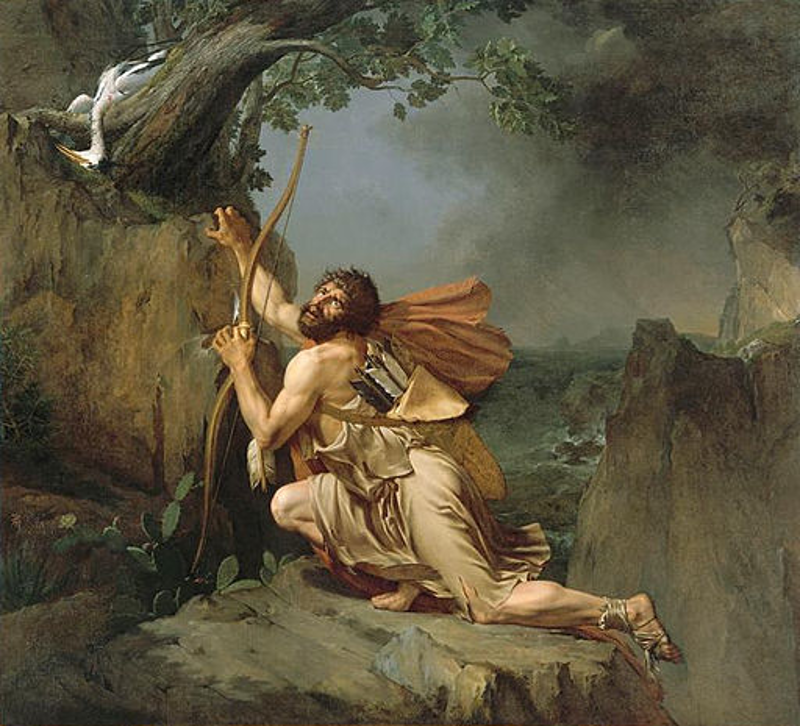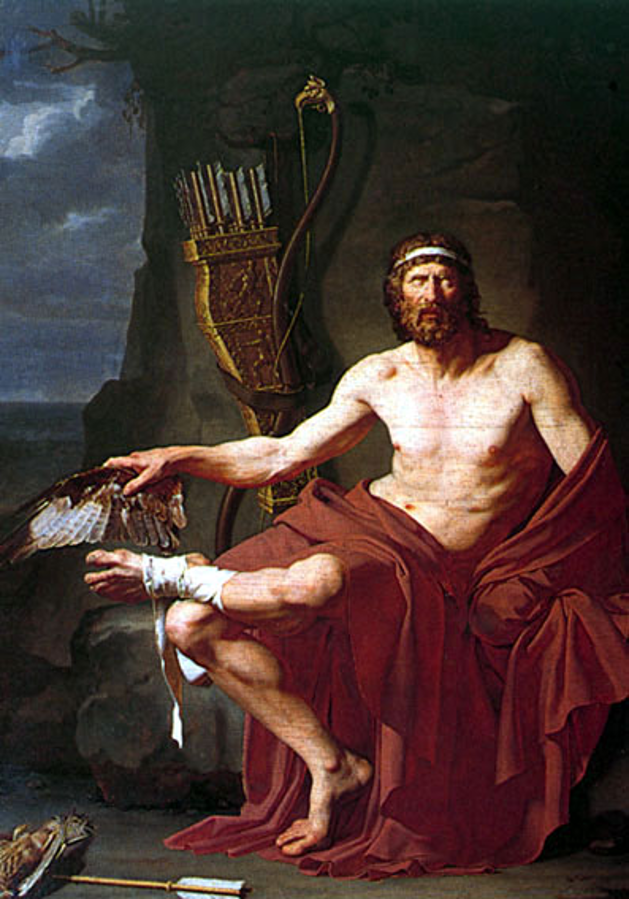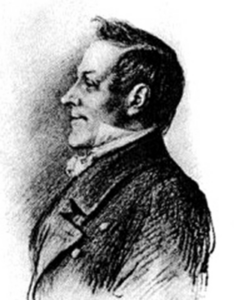Philoctetes
(Poet's title: Philoktet)
Set by Schubert:
D 540
[March 1817]
Da sitz ich ohne Bogen
Und starre in den Sand.
Was tat ich dir, Ulysses,
Dass du sie mir entwandt,
Die Waffe, die den Trojern
Des Todes Bote war,
Die auf der wüsten Insel
Mir Unterhalt gebar.
Es rauschen Vögelschwärme
Mir überm greisen Haupt,
Ich greife nach dem Bogen,
Umsonst, er ist geraubt.
Aus dichtem Busche raschelt
Der braune Hirsch hervor,
Ich strecke leere Arme
Zur Nemesis empor.
Du schlauer König scheue
Der Göttin Rächerblick;
Erbarme dich und stelle
Den Bogen mir zurück.
I am sitting here without my bow
Staring into the sand.
What did I do to you, Ulysses,
That led you to take it from me
The weapon which for the Trojans
Was intended as a harbinger of death?
The weapon which, on this deserted island,
Served to keep me alive?
Flocks of birds are sweeping
Over my grey head;
I reach for my bow –
In vain – it has been stolen.
There is rustling in the thick bushes,
A brown deer comes out:
I stretch my empty arms
Up towards Nemesis.
You sly king, beware of
The avenging gaze of the goddess!
Take pity – and bring
The bow back to me.
All translations into English that appear on this website, unless otherwise stated, are by Malcolm Wren. You are free to use them on condition that you acknowledge Malcolm Wren as the translator and schubertsong.uk as the source. Unless otherwise stated, the comments and essays that appear after the texts and translations are by Malcolm Wren and are © Copyright.
☙
Themes and images in this text:
The ancient world Anger and other strong emotions Arms and embracing Birds Bows and arrows Brown Bushes and undergrowth Deer Deserts Emptiness and fullness Gazes, glimpses and glances Grey Heads Islands Sand Thieves and robbers Vengeance
The only surviving ancient Greek tragedy about Philoctetes (Φιλοκτήτης) is the version by Sophocles, written in 409 BCE, but it is known that other plays on the theme were written (by Aeschylus and Euripides) and that different versions of the story were current in the ancient world. In the play by Sophocles (Mayrhofer’s main source) Philoctetes is tricked by Ulysses (=Odysseus), who has found that he can only defeat the Trojans if he has control of Heracles’ miraculous bow.
At his death, Heracles (Hercules) had bestowed this bow on Philoctetes, a great archer. Philoctetes had been part of the original party of Greeks who had set out to besiege the city of Troy and win back Helen after she had been abducted by Paris. Before arriving at Troy Ulysses and his companions began to be repelled by Philoctetes because of his ulcerous foot (a result of a snake bite). Either the smell or his cries of pain (or both) became too much for his shipmates, with the result that Ulysses decided to abandon Philoctetes on Lemnos, a deserted island. There he lived on, shooting birds and other animals with his mighty bow. He found a few herbs to soothe his wounded foot, but the pain persisted.
As Troy was besieged, while Troilus met Cressida, while Achilles fought Hector, Philoctetes hobbled around Lemnos but kept control of Heracles’ bow. Then, ten years after the beginning of the siege, came a point when the Greeks realised that they would need that bow to achieve final victory, and so Ulysses decided to take Neoptolemus (Achilles’ son) to Lemnos to help him capture Philoctetes and the bow.
Mayrhofer chose a point about two thirds through Sophocles’ play where Philoctetes realises that he has been tricked. Ulysses has used the genuine sounding Neoptolemus to achieve his purposes and the bow has been stolen. It is not clear at this point whether or not Philoctetes is going to be abandoned again or whether he is going to be taken off to Troy. Whatever happens, Philoctetes is coming to terms with an irreparable loss. Alongside his bow, he has been deprived of hope. For ten years he has survived despite his agonising wound because he had access to a bow, and therefore food and protection. It was not just the bow itself, of course, but his own skill at using it. Each successful arrow reinforced his conviction that his life was valuable and that he would eventually be rescued and be able to make a contribution to human society. Now, without his bow he can offer nothing. He is at the mercy of the elements and the forces around him. If he is not killed by the wild animals that emerge out of the undergrowth, his ulcerated foot will kill him. His achievement of surviving for ten years on a desert island will have become pointless.
When birds fly over him or when an animal rushes at him out of the bushes his automatic response is to reach for his bow, but now the arms that he stretches out are empty. In his abandonment all he can do is appeal to that most abstract of all Greek goddesses, Nemesis, the force of righteous anger and retribution.
Graham Johnson has suggested that Mayrhofer was expressing sympathy for the victims of his own official job as a government censor, that he saw himself as a Ulysses figure whose function was to deprive fellow poets of their bows (their poetry). His own depressive personality led him to feel that he himself needed to beware of the ‘avenging gaze of the goddess’ Nemesis. It might equally be the case, though, that Mayrhofer is identifying with Philoctetes by seeing himself as having lost his own gift for poetry. His depression has led him to lose faith in his own writing. He is aware of images around him, he sees movement over his head, he hears things coming towards him, but when he reaches out to capture them in poetic language he can no longer pin them down.

Paris, Louvre

Musée de Chartres
☙
Original Spelling and note on the text Philoktet Da sitz' ich ohne Bogen Und starre in den Sand. Was that ich dir, Ulysses? Daß du sie mir entwandt Die Waffe, die den Trojern1 Des Todes Bothe war; Die auf der wüsten Insel Mir Unterhalt gebar. Es rauschen Vögelschwärme Mir über'm greisen Haupt; Ich greife nach dem Bogen - Umsonst - er ist geraubt. Aus dichtem Busche raschelt Der braune Hirsch hervor: Ich strecke leere Arme Zur Nemesis empor. Du schlauer König scheue Der Göttin Rächerblick! Erbarme dich - und stelle Den Bogen mir zurück. 1 The published version (1824) of Mayrhofer's poem reads 'dem Feinde' (for the enemy) not 'den Trojern' (for the Trojans). It is impossible to know if Schubert made the change when he made the setting or if he was working with an earlier draft of the poem.
Confirmed by Peter Rastl with Gedichte von Johann Mayrhofer. Wien. Bey Friedrich Volke. 1824, pages 152-153.
To see an early edition of the text, go to page 152 [166 von 212] here: http://digital.onb.ac.at/OnbViewer/viewer.faces?doc=ABO_%2BZ177450902


